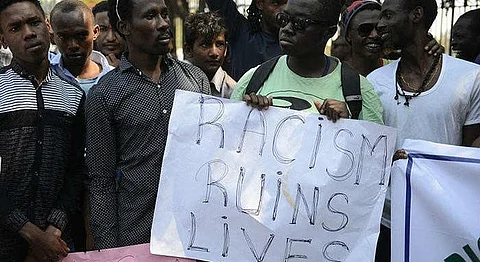
- HOMEGROWN WORLD
- #HGCREATORS
- #HGEXPLORE
- #HGVOICES
- #HGSHOP
- CAREERS
- ABOUT US
- CONTACT US

[This story first appeared on desihiphop.com. It has been republished here with permission from the publication]
It was a Thursday hip-hop night, the crowd was an eclectic mix, the dance floor was buzzing with people wanting to get down and the energy of the music was flowing through all in attendance. An hour into the night, just as the music started to get pumping, an argument broke out between the bouncer and an African-American man who was being harassed by a group of Indians at the entrance. The man left the nightclub and everyone continued as normal.
Hate crimes are on a rise globally, but India being a multi-cultural nation, you would expect a more tolerant and accepting environment. Still, you’d be wrong to believe so and the media in India is reluctant to write about such topics.
Discrimination based on color and race is appalling, considering that the music we all enjoy listening to found it’s origins from people who don’t belong to a fairer race. Is our social conditioning to be blamed ? ‘Fair is beautiful’ is something deeply ingrained in all Indians. The problem is a lot worse when people from other countries are meted out unfair treatment.
Lenku Sowaya from Nigeria who now lives in India and works as an actor in the Telugu Film industry says, “I have been racially discriminated; as a matter of fact it has happened so often that I am now used to it, may seem funny but that’s how bad it is. I have been to restaurants, hotels and other places where I was told at the entrance that there was a private event going on, that they were closed for the day or given some kind of excuse to deny me entrance just for being black. I attended a friend’s wedding ceremony recently and I was approached by a man asking ‘who invited me’. I was the only black person at the event and I was the only one who was approached and that makes a huge statement about how people perceive other people in this country based on their colour.”
According to Lenku the media is silent but news makes it through to people via social media these days. “Maybe the purpose is to protect the image of the nation by trying to conceal information on certain events, but it is doing more harm than good. This country must also realise that they have Indian citizens living abroad and that there are more Indian nationals in other countries than any other. I’m sure India would like for them to be treated with respect and fairness.” Lenku echoes the feeling of this unsafe environment in such a diverse country and how the lack of media support encourages the locals to commit more hate crimes.
Mumbaikar, Jayesh Veralkar, who is a music enthusiast says, “I have experienced discrimination based on colour right from my childhood. My dark skin color got me a common unwanted nickname ‘Kalia’. I have seen many others going through it too. I have known girls who have gotten rejected from an arranged marriage proposal due to their skin colour – fairer skin is always preferred. Indians are the most racist is what I feel. I have seen peers around me giving more preference to white skin (foreigners) but African or African-Americans don’t get similar treatment. People are not as friendly to them as they would be to a white skin person.”
Rapper Bob Omulo aka Bobkat who is of Kenyan origin, echoes similar sentiments on the subject of racism. “I have definitely faced racism,” says Bob who believes that people who consider themselves hip-hop heads are totally unaware of what it is really about. “I see some of them sharing and laughing at racist jokes online. I wouldn’t hold every hip hop fan or artist I know to the same scale. There are those that know what it’s all about, the ones that don’t need explaining about what “Black Lives Matter” is all about, the ones that know you can’t be mistreating your house help and still claimto be conscious.” He continues, “Then on the other hand, there are those that argue that discrimination is none of their business. Hip-hop has always been political from day one, and it’s always championed the cause of the oppressed worldwide, so countenancing prejudice and embracing hip-hop simultaneously is either ignorance or hypocrisy,” he explains, adding that holding society responsible for the injustice is not always right. It’s a matter of personal choice.
“We’re all products of societies we grow up in to an extent, so some may seem to see it as normal to be unjust, while others may not. But beyond childhood, everyone carries the consequences of their actions. I have many friends and neighbours that are like family, even though they grew up in a homogeneous set up that never prepared them for a multi racial environment. At the end of the day, I consider it a personal choice, blaming society is extenuating because society is you and I. There’s no reason why one will be just and another unjust coming from the same society, other than by personal choice,” he concludes.
